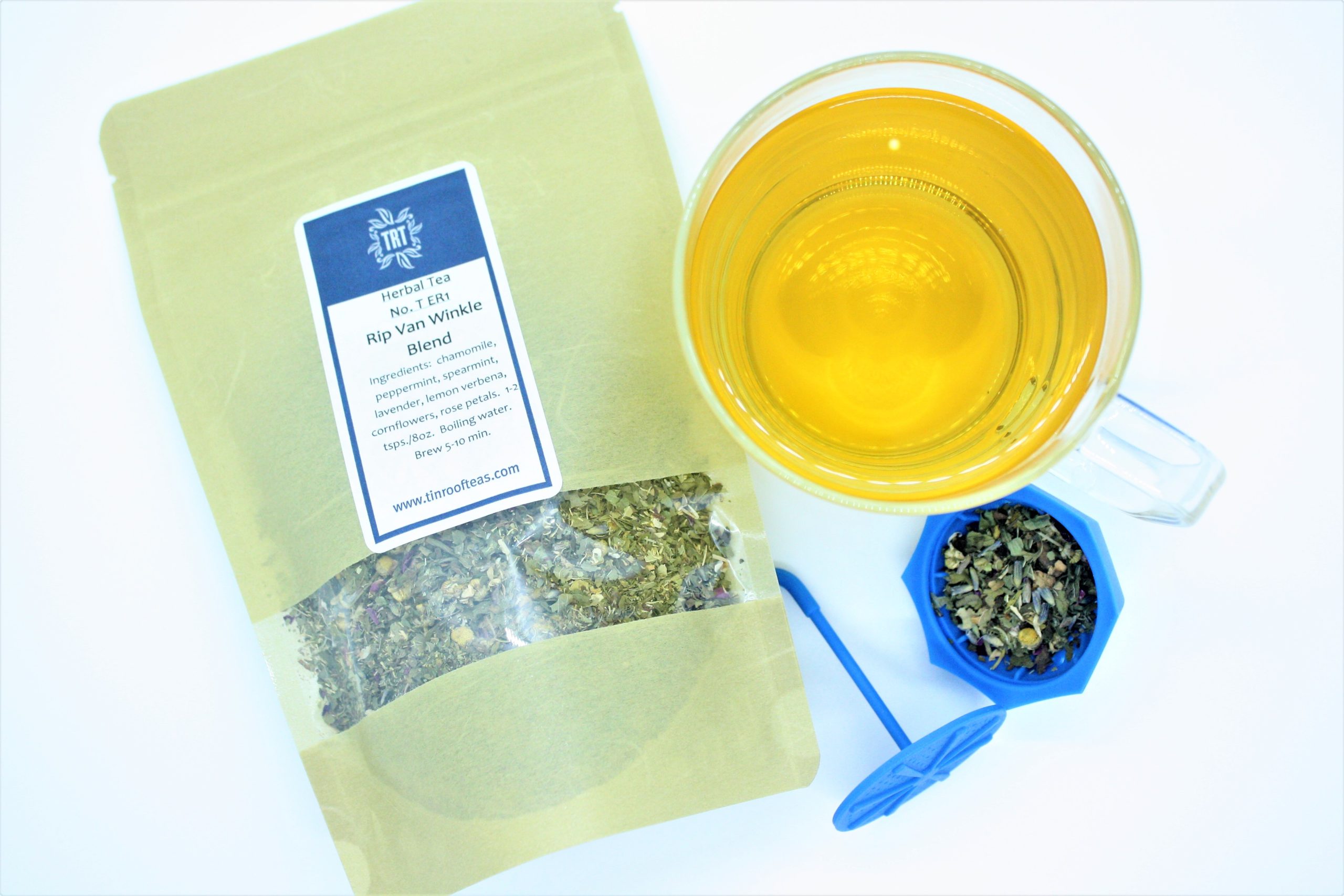Do You Suffer From Insomnia?

What is Insomnia?
Insomnia is described as having difficulty falling asleep or staying asleep. People who experience insomnia generally suffer from a myriad of symptoms including fatigue, low energy, difficulty concentrating, mood swings, and decreased performance. Sleep disturbances can be caused by several reasons. Acute insomnia is not being able to fall asleep due to something like stress about an event happening in your life. Chronic insomnia is when this continues for at least three nights per week and lasts at least three months. This type of insomnia usually occurs for many different reasons; shift work, clinical disorders, and certain medications. According to sleepfoundation.org, 40 million Americans experience insomnia annually.
There are many herbal remedies for insomnia and at Tin Roof Teas we have created Rip Van Winkle to help you relax at the end of a long day so you can rest better. You can find ingredients such as chamomile flowers, peppermint leaf, and lavender flowers, among others, that make up this best-seller. If that one doesn’t work, we have a second option, Morpheus. As we’ve described on our website, Morpheus packs a punch! With many of the same ingredients as RVW, Morpheus also includes our own custom-blend of sedatory herbs.
1. Spearmint is like peppermint. It has the same cooling effects but has less menthol. Spearmint has a bit of a sweeter flavor than peppermint. Generally recognized as safe in normal doses, but high doses of spearmint can affect the liver and kidneys.
- Benefits:
- Calming
- Helps with digestion
- Reduces stress
- Contains antioxidants
2. Peppermint is cooling, acts as a pick-me-up, and has numerous benefits. When iced, it can be refreshing and energizing and in contrast, when hot, it can be very soothing and calming. It’s also able to settle an upset stomach and soothe nausea. Peppermint leaf contains menthol oil which can act as a digestive enzyme. Combined with alfalfa, its digestive benefits are amplified. Anyone suffering from cold or flu symptoms such as a clogged, foggy head might find relief with warm peppermint tea. The muscle relaxant effects of peppermint could help relax before bedtime. This herb is generally recognized as safe, but some have reported increased symptoms of heartburn or reflux.
- Benefits:
- Calming effects
- Digestive upset gas, bloating, indigestion
- Antispasmodic: acts as a muscle relaxant, decreases cramping
- Antibacterial, antiviral, anti-inflammatory
- Antiallergic: compound rosmarinic acid reduces symptoms of allergic reactions such as the runny nose, itchy eyes
3. Lemon verbena and lemon balm are sometimes confused for one another, but they are different plants with different properties. Lemon verbena contains oils, terpenoids, phenolic acids, and flavonoids. Flavonoids are known to be an anti-inflammatory, antioxidant, and anti-tumor. This herb is generally recognized as safe.
- Benefits:
- High antioxidant qualities can aid in muscle repair and tissue health
- Lowers inflammation, good for arthritis
- Eases the mind, recommended for chronic stress/anxiety
- Can act as a sedative
4. Lavender: The smell of lavender on its own can cause calming effects for some. Lavender has a myriad of benefits ranging from digestion to pain relief to increase overall well-being. Lavender is commonly known as a concentrated oil but can also be brewed into a tea. This herb is generally recognized as safe.
- Benefits
- Antiseptic and anti-inflammatory
- Calming; it can help with mood disorders and anxiety
- Gas/digestion/upset stomach
- Hair growth
- Mild pain relief
- Eczema relief
- Sedative
5. Chamomile is a very well-known herb. Many studies have been done on the health benefits of this little golden flower. When we feel better, we sleep better. The benefits of chamomile can be experienced in many forms such as an essential oil and steeped as a tea. Chamomile flowers have azulene, a volatile oil that is considered for heat in the body. This may help with conditions such as joint pain, arthritis, general aches and pains, and headaches. Those with ragweed allergies might have a sensitivity to chamomile and may enhance the effects of anticoagulants. Women who are pregnant should limit chamomile tea to one or two cups.
- Benefits:
- Anti-inflammatory
- Anti-fever
- Antispasmodic, may act as a muscle relaxant
- Soothes gastrointestinal disorders (ulcers, IBS)
6. Rose imbues a sense of love and wellbeing. It’s great for relaxation and enchanting your mood to help overcome stress and anxiety. Rose contains natural antioxidants that help fight free radicals that cause cell damage and breakdown. This herb is generally recognized as safe.
- Benefits:
- Calming
- Enhances mood
- Soothes irritation
- Hydrating
- Contains antioxidants
With most Alternative Medicine and herbs, there is not a huge amount of research or large-scale trials performed to prove these benefits but there are many small studies where the effects of herbs were significant.
Before taking anything consult your physician and do your research. Make sure you know if there are any possible interactions before consuming herbs (like dandelion root and antibiotics). Always consult your doctor if you’re already taking medication as some herbs can amplify or diminish the efficacy of prescription drugs.
To check for contraindications of herbs and medication, refer to this website: https://www.drugs.com/
Written by
Ashley Byrd
Resources:
https://www.indigo-herbs.co.uk/natural-health-guide/benefits/lemon-verbena
What is Insomnia? https://www.sleepfoundation.org/insomnia/what-insomnia
Wexler, Alyse. (2017) Does valerian root treat anxiety and insomnia? retrieved from https://www.medicalnewstoday.com/articles/318088
Imhoff, Jordyn. (2019) Are Melatonin Supplements Safe? retrieved from https://healthblog.uofmhealth.org/wellness-prevention/are-melatonin-supplements-safe
What Lavender Can Do for you? retrieved from https://www.healthline.com/health/what-lavender-can-do-for-you

